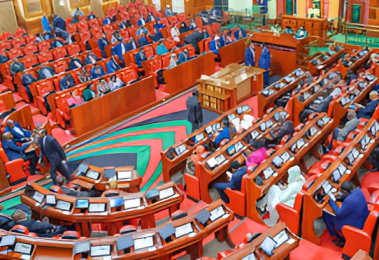MPs Grill REREC officials over Sh1.7 billion land survey payments and missing records

MPs were also alarmed by the revelation that mini-grid stations built in Wajir, Mandera, Garissa, and Turkana were constructed without legal titles
Top officials from the Rural Electrification and Renewable Energy Corporation (REREC) were taken to task by a parliamentary committee over billions of shillings in questionable payments, land acquisition irregularities, and unsupported expenditures flagged in audit reports covering three financial years.
Appearing before the Public Investments Committee on Commercial Affairs and Energy, REREC Chief Executive Officer Rose Mkalama and General Manager of Finance Davis Cheruiyot were grilled over how the corporation spent over KSh 1.79 billion on land survey services without updating official records or obtaining key approvals.
The session, chaired by Pokot South MP David Pkosing, focused on the Auditor General’s findings for the years 2020/21 to 2022/23.
Lawmakers questioned how REREC paid large amounts to surveyors while failing to submit updated land records to the Directorate of Surveys in Nairobi or to regional offices, leaving public maps incomplete and inaccurate.
In Kakamega, the audit revealed that right-of-way agreements were signed by individuals occupying land belonging to deceased persons, without valid letters of administration. This was flagged as a violation of Section 45 of the Law of Succession Act, which bars interference with a deceased person’s estate without legal authority.
Responding to the issues, Mkalama said reforms were underway.
“We have now established a Geospatial Department, a Lands Section, and an Advocacy Unit to strengthen internal controls, analyze land documents thoroughly, and sensitize the public on lawful land and wayleave acquisition,” she told the Committee.
Another major concern raised was REREC’s operation on adjudicated community land in Turkana and Kilifi counties without formal consent from County Governments, who legally hold the land in trust for communities.
While REREC said it had obtained approval from Turkana for the Lopacho Village project, it acknowledged skipping procedures in Takaye Village, Kilifi.
Mkalama said the corporation had started addressing the issue.
“We’re working closely with County Governments and local communities. Part Development Plans have been approved for most sites. Cadastral surveys are underway, with Garissa already completed. The rest will be finalized by FY 2025/26 before submission to the National Land Commission for titling,” she said.
MPs were also alarmed by the revelation that mini-grid stations built in Wajir, Mandera, Garissa, and Turkana were constructed without legal titles, raising concerns over the security of both public and donor investments.
Further scrutiny was directed at Sh2.25 billion listed as trade and other payables. Of this, Sh1.19 billion was not supported by invoices, while Sh830 million remained unpaid beyond the 90-day threshold.
REREC told the Committee that the delayed payments were backed by Local Purchase Orders and service entry sheets, and were pending due to standard contract retention periods.
However, the most glaring issue was the payment of Sh571 million to three survey firms for unclear projects. The Auditor General noted there were no contracts, service orders, or maps to justify the payments—prompting fears of procurement violations under the Public Procurement and Asset Disposal Act, 2015.
Mkalama admitted that the issue had been discovered through internal checks.
“Following internal investigations, five staff members found culpable for the irregular payments were dismissed. We have also requested the DCI to take up the matter for further action,” she stated.
Pkosing, the Committee chair, expressed concern over what he termed as potential collusion and negligence.
“This is a clear case of laxity, and possibly collusion, at the expense of the public. Institutions like REREC are at the heart of rural development. When such critical agencies falter in accountability, the poorest Kenyans suffer the most,” said Pkosing.
He added that oversight by the Committee carried a moral weight.
“We must reinforce financial discipline in all public entities. The Committee’s oversight is not just procedural or a committee on paper; it is a moral responsibility to ensure public trust is not betrayed.”
The Committee is expected to prepare a detailed report with its findings and recommendations, which could lead to law enforcement probes and wide-ranging reforms at REREC to improve accountability and transparency.
